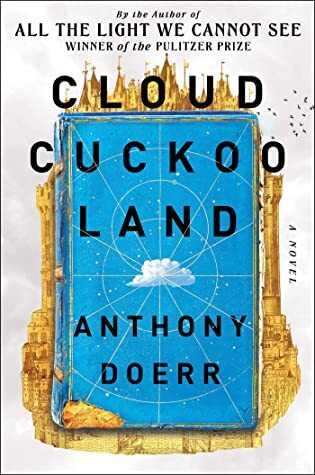Cloud Cuckoo Land, by Anthony Doerr

The first novel I read in 2022 was a Christmas gift, and an absolutely beautiful and absorbing book to start the year with. I’ve categorized it as General Fiction and Historical Fiction and Sci-Fi, because it’s a book of many stories and many genres. In true Anthony Doerr fashion, you can trust the disparate storylines to weave together at the end, but the beauty of the journey is the best part.
One storyline contains the fall of Constantinople in 1453, told from two perspectives: Anna, a young orphaned girl inside the city, and Omeir, a young oxen-driver conscripted into the ranks of the attackers. Another thread of the novel tells the story of Zeno Ninis, who begins life as a lonely child in mid 20th-century middle America, signs up for the Korean War and spends time in a POW camp, then in later life turns to translating ancient Greek texts and, almost by accident, teaching an obscure Greek story to a group of children in a library in February 2020.
Weaving into Zeno’s story and intersecting with it in a tragic way is the story of a teenaged boy who grows up in the same American town where Zeno lives as an old man. Seymour is the highly sensitive, neurodiverse son of a poor single mom. The only place Seymour is comfortable is in the woods behind their trailer, and when the natural beauty he relies on is devastated by a housing development, his discomfort with humanity blossoms into hatred and he is lured into a shadowy world of eco-terrorism.
The final thread of the story is the tale of Konstance, a young girl in the twenty-second century living aboard a multi-generational ship of refugees leaving earth to plant life on a new planet. As she grows up, Konstance has to grapple with the reality that the great project she is part of will not be realized in her lifetime — she will live and die aboard this ship in hope that her great-grandchildren may be settlers on a hospitable planet. Even more unsettling is the realization that not everything aboard the ship is what it seems to be.
Tying these stories together is an ancient Greek manuscript, lost for many years, rediscovered, translated, passed down and recreated — the tale of a fool who tries to reach a magical city in the clouds and is turned into various animals along the way. It’s a silly tale, but the ways in which the old manuscript intersects with each character’s story is a golden thread running through the novel.
One reviewer whose reviews I normally like and agree with found the book slow and ponderous and felt that the theme of “stories matter” was pounded home relentlessly. I obviously did not find it slow — I could hardly put it down — and while there definitely is an ongoing message that stories matter, the theme that came through for me was: how do humans cope with the end of the world? Each of these characters is, in some way, facing what appears to be the end of their world – and in the contemporary and future sections, the end of the actual world due to human-caused climate disasters is an ongoing theme. Faced with the loss of everything, how do we carry on? What does it mean to be human in these circumstances? I found this book to be a very engaging reflection on these questions.



